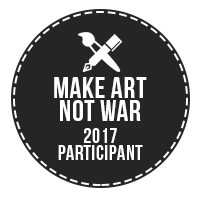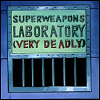
Born out of both my personal experiences and the knowledge that oppression tends to crush the artistic spirit on a cellular level, I have created a Make Art Not War 2017 Challenge for those who need it. This challenge, which came together from inspiration to draft guidelines, is designed to be flexible to work with your talents and lifestyle. Don’t be afraid to customize the specifics to fit your needs. Your art? Your rules.
Why take the Make Art Not War 2017 Challenge? When times are tough, the feeling that artists are not necessary tends to permeate because art is viewed as a luxury item in some cultures since we don’t produce food, clothing, or housing. The exact opposite is true, because art is a documentation and representation of our humanity and all our struggles. People turn to stories to find hope, to be inspired, to reach inside themselves and discover their own courage. This challenge is about making art to tap into your voice and tell your story. After all, one story can change the world. The problem is, we have no idea which story that will be, when it will be told, or in what medium. It’s up to us to find it–by making art!
Make Art Not War 2017 Challenge
I’ve designed the challenge to be simple, but grounded in four actionable areas. They are: Motivation, Discipline, Accountability, and Connection.
Rules Summary
This is a summary of the rules I’ve designed for the challenge. In the longer version, I offer means of customization to fit your lifestyles. After you’ve read the rules, write down in four-to-five sentences what you’ll pledge to do for 2017 and post them publicly or privately. Combined, those actionable items will help keep you grounded and focused on making art, while remaining connected to the world around you.
My Make Art Not War 2017 Challenge pledge:
- I pledge to devote one hour a day to my original art.
- If I don’t feel motivated, I pledge to write down the reasons why I wanted to take this challenge for fifteen minutes or one-to-three pages whichever comes first.
- I pledge to mark down on the calendar whenever I complete a day’s efforts.
- As the challenge creator, I pledge to create a weekly accountability post every Wednesday beginning on January 9th. Comments will be open. Hashtag #makeartnotwar2017 #manw2017
- I pledge to check into social media twice a week for personal use, and once a month with my local community of artists and writers.
Motivation
Find your personal reason to make art and use that as your rallying cry for 2017.
Artists are human beings, not robots. Writers need to discover our characters’ voices. Painters need to glance at a blank canvas and draw that first line. Musicians need to hear the first stanza. Sometimes, however, we get stuck. We don’t know what to write. We don’t know if our art will resonate. We don’t see how our words will matter–because we can’t predict the future so we freeze up. We punish ourselves. Then, we read the news and get depressed; or, we get bad news and get even more depressed. Caught in that never-ending cycle of wondering what our worth is, some artists cease to create altogether.
There are 1,000 reasons to never pick up that pen, that inkwell, that stylus. What is more important? Those precious few reasons why you’re making art. Before you begin the challenge, figure out why you want to make art to find your motivation. Maybe you have a mantra, like “I want to make readers laugh.” Maybe, however, making art is so ingrained in your identity you might say: “I need to write to be happy.” Or, maybe you have a goal or business plan that helps keep you grounded on: “I need to draw to pay the bills”.
When you get stuck, take fifteen minutes and remind yourself that you’ve taken this challenge because your art is important to you. Abandoning the act of making art is not an option, and you will not retreat. Say that reason out loud, sing it, letter it, draw it–whatever you need to do. Focus on that mantra and recharge your artistic batteries, for the well of inspiration you draw from will never empty, not as long as you have the will to draw from it. After all, motivation is about reminding yourself how to find the will to make art when you lose it.
Discipline
Discipline is the time you will take every day in 2017 to make art.
The challenge is designed around spending one hour every day to make your original art.
Modifications are as follows:
- Subtract Half an Hour: Thirty minutes is good for beginners! If this allotted time does not challenge you, however, consider upping it to 45 minutes or an hour.
- Add Fifteen Minutes: Tackle one household chore or personal health item every day like making the bed, eating vegetables, flossing, etc.
- Add Half an Hour: Get moving, get grooving. Pledge to dedicate this time to a physical activity like biking, climbing stairs, going for a walk, going to the gym, etc.
- Add an Hour: Switch techniques, genres, art forms and start something brand new–or double your time.
One thing to keep in mind, is that it doesn’t matter how good the art is you make if you are learning. Stretching the boundaries of what you normally do often means that your first attempts will probably suck. That’s okay! Give yourself permission to suck, but also to improve, revise, refine. You cannot see how far you’ve come, or how you’ve internalized the techniques you’ve been practicing, unless you put the time in. This is why discipline is needed to keep you on track.
A few things to think about depending upon your situation:
- One hour writing sprints typically yield 750 to 1,200 words of text.
- To hit the NaNoWriMo word count goal of 50,000, you would average 1.5 to 2 hours of writing every day.
- If you’re a professional artist, consider using this hour to create something you haven’t sold or been contracted to create yet. Think of this as your pie-in-the-sky wish list!
- If you need supplies, pay yourself a dollar every time you make art.
- If you have kids, roommates, or family obligations, consider working out a time where you have an hour to yourself or, alternatively, break it up into two half-hour segments.
- To instill discipline, you will need consistency. If you know you’re going to miss a day, either plan to make it up (if that works for you) or spend half the time on it instead.
The keys to making your own art on a regular basis is commitment. The motivation is the “why”, the discipline is the “how”, and the accountability is the “what”.
Accountability
Pledge to hold yourself accountable to this Make Art Not War 2017 Challenge.
It’s one thing to say you’re going to make art or write that novel or what have you, it’s another to actually do it. Accountability is about proving to yourself that you have done the work you pledged to do.
Methods for accountability include:
- Use a diary and write journal entries to mark your progress.
- Buy a calendar and put smiley face stickers on it, or use the calendar on your phone.
- Buddy up and find someone else who’s taking this challenge to hold each other accountable.
- Check in every Wednesday here on my website, beginning on January 4th. Comments will be open.
- Print out a free calendar and “X” off the days.
- Use the hashtag #makeartnotwar2017 or #manw2017. Share your efforts every week–even talking about it with other challengers will help!
Accountability doesn’t have to take a long time; just by checking off a date on your calendar right after you’re done will complete this part of the challenge. There is no greater sense of accomplishment than being able to quickly look back at what you’ve done. Super important!
Connection
Manage your connections with your online and offline communities to remain focused but grounded.
For this challenge, connection taps back into the reasons why you’re making art. A story you write could make someone cry. A digital painting you create could instill a sense of wonder. The art you produce is a unique part of your identity, your humanity, and at the other end of your art is a reader, viewer, or player who’s interacting with your creation. Often, the best art evokes an emotional reaction, regardless of how well its crafted. Our relationships help give us the connections needed to understand the spectrum of human emotion. They also provide the means for self-care, and a tool to help us support one another.
Unfortunately, our connections can work against us because there are so many different ways to connect, that they wind up distracting us from what we want to accomplish as artists. The truth is that artists need solitude in order to create; being alone, even when it’s depicted in a positive, almost spiritual light, carries many stigmas with it. We hear the word “loner” and internalize our need or enjoyment of solitude as being wrong or bad or a sign that we’re broken. We need that “alone time” to focus, to listen to our innermost selves, to channel our voices into making art before we can share our creations with others.
This leg of the challenge is about managing your ability to connect against the discipline required to make art. For me, that is broken up into two, distinct parts: offline and online. Your mileage on these two areas in particular will vary widely, depending upon your situation.
I am listing below what I’m pledging to do for my challenge, in the hopes that you’ll use this as a baseline.
- Weekly Check-In: Pending any work-related promotions, interviews, this challenge, etc., I pledge to check in to social media no more than twice a week for personal usage.
- Quarterly Downtime: A few years ago, I took 100 days off of social media, and since then I’ve found that it took me two weeks to reset. I usually take the week off after a big show, but I will consider taking more of these breaks if limiting my access is not effective.
- Monthly Connection: I started this back in October/November, but it bears repeating now. Once a month, I am connecting with other artists/writers in my local community–outside of convention season.
Now that I’ve written the rules, it’s time to spend the last two weeks of the year reflecting on what I want to do for my challenge by reviewing what I’ve got on deck. I will post next week about this in particular, to help you prepare as well.
Rise up. And take the Make Art Not War 2017 Challenge with me!

